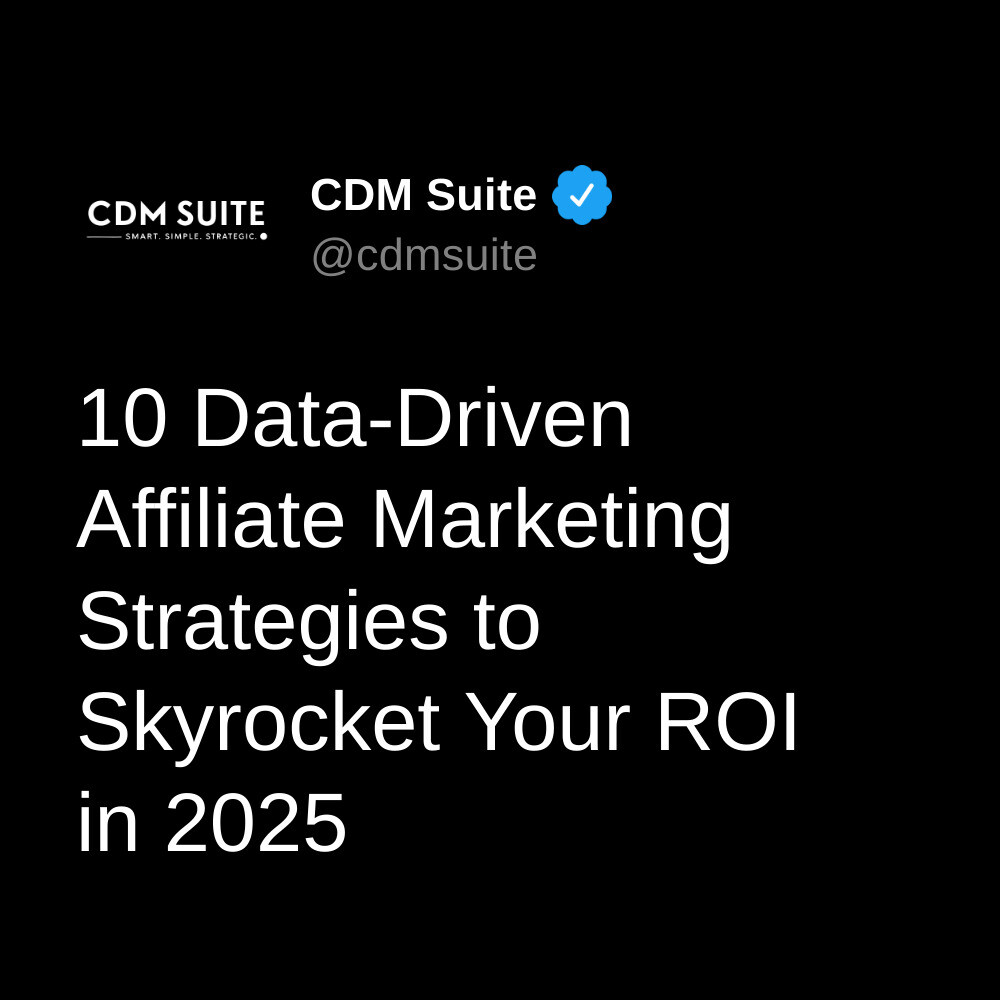10 Data-Driven Affiliate Marketing Strategies to Skyrocket Your ROI in 2025
In the fast-paced world of digital marketing, leveraging data-driven strategies has become essential for affiliate marketers looking to maximize their return on investment (ROI). As we navigate through 2025, the ability to harness and interpret vast amounts of data is no longer optional—it’s a necessity for staying competitive and driving meaningful results.
Why Data-Driven Affiliate Marketing Matters
Data-driven affiliate marketing empowers marketers to make informed decisions based on concrete evidence rather than gut feelings or assumptions. By leveraging analytics, affiliates can optimize their campaigns in real-time, target audiences with laser precision, and significantly improve their ROI.
10 Powerful Data-Driven Strategies for Affiliate Success
1. Implement Advanced A/B Testing
Continuously run A/B tests on various elements of your campaigns, from email subject lines to landing page designs. This method allows you to optimize your efforts in real-time and make data-driven decisions that enhance campaign performance.
2. Conduct Thorough Traffic Source Analysis
Track and analyze your traffic sources to identify which platforms, websites, or social media channels are driving the most clicks and conversions. This data enables you to focus on high-performing channels and reallocate resources from underperforming ones.
3. Leverage Predictive Analytics
Utilize predictive analytics to forecast trends and consumer behaviors. This forward-looking approach allows you to stay ahead of the curve and proactively adjust your strategies for maximum impact.
4. Optimize Conversion Rates with Data Insights
Use data insights to optimize your conversion funnel. Analyze user behavior on your site to identify bottlenecks and implement changes that improve the user experience and boost conversions.
5. Personalize at Scale
Harness data to create hyper-personalized experiences for your audience segments. Tailor your content, offers, and product recommendations based on individual user preferences and behaviors.
6. Implement Dynamic Pricing Strategies
Use real-time market data and consumer behavior insights to adjust your pricing strategies dynamically. This approach can help you maximize profits and stay competitive in a rapidly changing market.
7. Utilize AI-Powered Chatbots
Implement AI-driven chatbots to engage with potential customers, answer queries, and guide them through the conversion funnel. These chatbots can collect valuable data on user preferences and behavior, further informing your marketing strategies.
8. Embrace Cross-Channel Attribution Modeling
Implement advanced attribution modeling to understand the true impact of each marketing touchpoint across various channels. This insight allows you to allocate your marketing budget more effectively and optimize your overall strategy.
9. Leverage Influencer Analytics
Use data analytics to identify and partner with influencers who have the most relevant and engaged audience for your products. Analyze metrics beyond follower count, such as engagement rates and audience demographics, to ensure the best fit for your brand.
10. Implement Real-Time Bidding (RTB) for Affiliate Ads
Utilize RTB platforms to optimize your ad placements and bids in real-time based on user data and market conditions. This approach can significantly improve the efficiency and effectiveness of your ad spend.
Essential Tools for Data-Driven Affiliate Marketing
To effectively implement these strategies, affiliates need the right tools in their arsenal:
- Analytics Platforms: Tools like Google Analytics or Adobe Analytics provide comprehensive insights into user behavior and campaign performance.
- Affiliate Tracking Software: Platforms such as Post Affiliate Pro or PartnerStack offer detailed performance reporting and real-time data visualization.
- AI and Machine Learning Tools: These technologies can help predict trends, optimize bidding strategies, and automate personalization efforts.
- Data Visualization Tools: Software like Tableau or Power BI can help you create intuitive graphs and charts to spot trends faster and identify top performers.
Overcoming Challenges in Data-Driven Affiliate Marketing
While the benefits of data-driven strategies are clear, there are challenges to navigate:
- Data Privacy Regulations: With laws like GDPR and CCPA, affiliates must ensure they’re compliant in their data collection and usage practices.
- Data Quality: Ensuring the accuracy and relevance of your data is crucial for making informed decisions.
- Skill Gap: Interpreting complex data sets requires specialized skills. Invest in training or consider partnering with data analytics experts.
The Future of Data-Driven Affiliate Marketing
As we look ahead, the role of data in affiliate marketing will only grow more significant. Emerging technologies like artificial intelligence and machine learning will enable even more sophisticated analysis and prediction capabilities. Affiliates who embrace these data-driven approaches will be well-positioned to thrive in the increasingly competitive digital landscape.
By leveraging data to improve targeting, optimize campaigns in real-time, and make informed decisions, affiliates can significantly enhance their performance and ROI. The key is to continually test, learn, and adapt based on the insights gleaned from your data.
Are you ready to take your affiliate marketing to the next level with data-driven strategies? Visit CDM Suite’s free 3-minute marketing assessment to get a custom growth plan and find out exactly what’s missing in your marketing strategy!



